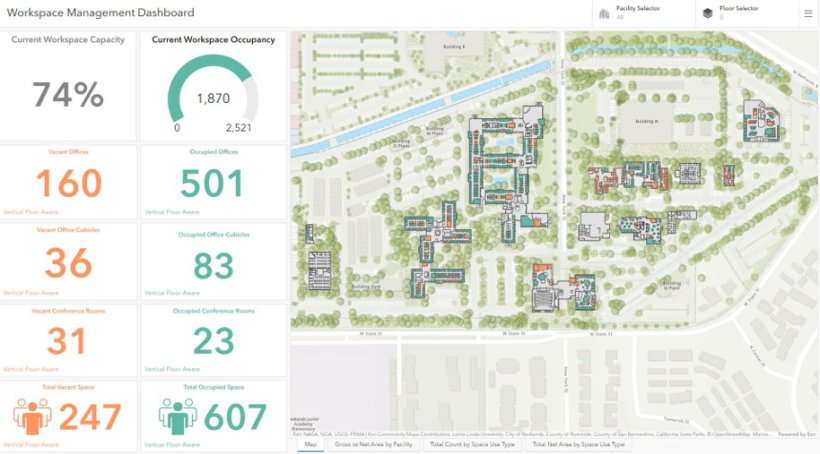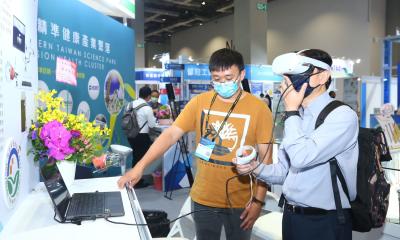© Esri UK
Article • Realising the potential of Smart Hospitals
Digital technology to optimize use of hospital space
From identifying under-utilized rooms to tracking spare mobile equipment like wheelchairs, spatial awareness technology is evolving to improve day-to-day operations on healthcare sites. The technology, which is already being deployed in airports, universities and industrial premises, is now seeing growing applications within hospitals. At the HETT (Healthcare Excellence Through Technology) North conference in Manchester, an expert explained how geospatial technology enables hospitals to make more efficient use of their space and assets.
By Mark Nicholls
At the core of this technology are so-called Geographic Information Systems (GIS), which acquire and integrate data from various sources. Duncan Booth, Head of Health and Social Care at the GIS software company Esri UK, explained: ‘We transform data using geography to help people look at data through a different lens. By doing that, they unlock different insights.’ This can, for example, identify the location of an asset such as a bed, scanner or wheelchair, or help a hospital monitor its infrastructure.
Digital twins visualize unused hospital space
A first step is integrating data from CAD (computer-aided design) drawings or building plans. That information is then converted into an “indoors model”, where the interior can be seen in the context of its surroundings geographically. ‘Once we have created an indoor model we can engage and interact with it and integrate it with a space management systems to see how space is being used,’ added Booth.

© Esri UK
This also offers an interactive dashboard and from that it is possible to track hospital assets, though each must give off a signal such as via an RFID (radio-frequency identification) tag. The Esri system can then consume the signatures emitted with real-time information accessed by authorized staff to take asset or space management decisions.
To assess how spaces such as wards or meetings rooms are being utilized requires a Bluetooth “beacon” system that can detect how many assets are in certain rooms, for example. Booth said: ‘Once all of that is in place it is a case of bringing data into the system and because we have the indoors model, we can see physically where things are in real time.’ This technology addresses the common issue of hospitals not using available space efficiently.
Data set visualisation and asset tracking
While the concept is relatively new for healthcare, this technology has been implemented at two pioneering hospitals where Esri is involved: Airedale General Hospital in Keighley, Yorkshire, and Manchester University NHS Foundation Trust.
At Manchester, developers have incorporated an indoor spatial model into the hospital's existing management infrastructure, creating a dashboard that monitors space utilization across both clinical wards and administrative area. ‘Essentially, we are creating an intelligent map of the entire estate,’ the expert said. ‘Using floor plans and room information, we are building a floor aware information model where we can overlay and visualise different data sets.’ Additionally, ESRI is piloting advanced asset tracking capabilities throughout the facility.

© Esri UK
At Airedale, the technology has been implemented to address critical structural integrity concerns – specifically monitoring degradation patterns in Reinforced Autoclaved Aerated Concrete (RAAC) panels. Staff equipped with iPad-based tools to survey areas and capture information to create a visual map covering 50,000 panels. Booth said: ‘From that, the project manager can see which of the RAAC concrete panels are high-risk and how they are deteriorating over time.’
The acquired data is constantly being built upon and gradually used for expanded applications. Esri advocates this incremental approach to health, beginning with targeted implementations that can scale organically as institutional needs evolve. ‘With Manchester, for example, they approached this by firstly looking at space management, getting CAD drawings into the system and helping manage space better. That then led us on to asset tracking.’
‘Unlocking efficiencies’
Outlining the concept at HETT North in February, Booth said: ‘Our focus is on transforming data into actionable insights. We use location as a predominant thread, collecting siloed disparate data to create an integrated operational picture. Geospatial technology is unlocking efficiencies that can help better decision making and ultimately improve patient care.’
While the solutions can integrate with existing hospital systems, Esri UK recognise that the process can require upskilling and that clients also have to consider their digital strategy and the resources and capability within their teams.
Profile:
Duncan Booth is Head of Health and Social Care at Esri UK and an expert in leveraging technology to drive digital transformation across health and social care. With nearly two decades of experience in technology, data and strategic planning, he works to empower organisations to unlock actionable insights that enhance service delivery, resource allocation, and long-term sustainability.
16.07.2025





